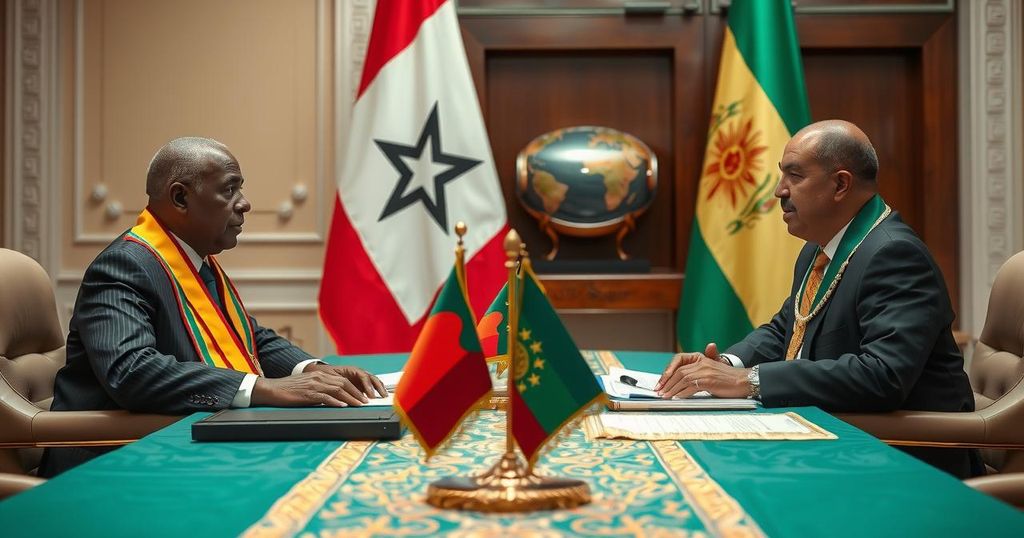Ethiopia is reportedly lobbying for the removal of Somalia’s Foreign Minister Ahmed Fiqi, amid increasing resistance from Egypt. President Hassan Sheikh Mohamud’s visit to Ethiopia aims to restore diplomatic ties, although Fiqi’s absence raises questions about internal political maneuvering and the government’s foreign policy direction amidst regional tensions.
Recent developments indicate that Ethiopia is engaging in efforts to replace Somalia’s Foreign Minister, Ahmed Fiqi, amidst rising tensions within the region. This situation is complicated by Egypt’s opposition to the proposed replacement. Concurrently, Somali President Hassan Sheikh Mohamud is on a visit to Ethiopia, where he has been welcomed warmly by Prime Minister Abiy Ahmed. During their discussions, the two leaders have formally restored diplomatic relations between the two nations, marking a significant diplomatic step.
Notably, Foreign Minister Ahmed Fiqi is not part of President Hassan Sheikh’s delegation, as he is currently engaged in talks in Egypt concerning a trilateral alliance involving Egypt, Somalia, and Eritrea. This coalition is perceived as an effort to balance Ethiopia’s growing influence in the Horn of Africa. Instead, Somalia’s Minister of State for Foreign Affairs has accompanied the president, while Ahmed Fiqi’s absence raises questions about his future role amid these political maneuvers.
The outreach to Ethiopia by President Hassan Sheikh is believed to be an attempt to weaken the ties between Villa Somalia and regional states, particularly Puntland and Jubaland, which have maintained strong relations with Ethiopia. These regions share a significant border with Ethiopia and have historically collaborated on security matters. Recently, Somalia’s agreement to include Ethiopian troops in the African Union peacekeeping framework reflects the importance of this relationship.
Egypt’s stance against the replacement of Foreign Minister Ahmed Fiqi is indicative of the broader geopolitical competition in the region. Cairo aims to solidify its partnership with Somalia and Eritrea to counterbalance Ethiopia’s influence. This power struggle echoes previous instances where Somali officials faced dismissal for perceived alignment with Egyptian interests. Analysts are questioning whether Ahmed Fiqi may encounter similar challenges as political dynamics evolve.
President Hassan Sheikh’s administration faces criticism for lacking a coherent foreign policy, which some observers argue appears more focused on personal interests than strategic national goals. This perceived inconsistency has rendered Somalia vulnerable to external pressures, jeopardizing its sovereignty and stability in the aftermath of protracted conflict. As Ethiopia and Egypt vie for influence in Somalia, these tensions highlight the complex geopolitical landscape shaping the Horn of Africa.
The Horn of Africa is experiencing increasing geopolitical rivalry, particularly between Ethiopia and Egypt, that significantly impacts Somalia. Ethiopia has had a robust relationship with Somali federal member states, particularly Puntland and Jubaland, which complicates the dynamics as Somalia’s central government seeks to navigate its foreign relations. The region is marked by historical alliances, security concerns, and external influences that shape the political climate and the internal affairs of Somalia. Recent decisions, such as the inclusion of Ethiopian troops in peacekeeping initiatives, underscore the intricate balance of power at play. As these nations forge alliances, Somalia’s leadership contends with both internal pressures and external geopolitical maneuvers, particularly concerning its foreign policy direction.
The internal and external pressures on Somalia’s foreign policy reveal the complexities of regional politics in the Horn of Africa. As Ethiopia and Egypt engage in a struggle for influence, the absence of Foreign Minister Ahmed Fiqi during critical diplomatic discussions raises concerns about his future role in the Somali government. The developments underline the importance of cohesive foreign policy to maintain national sovereignty while navigating the challenges posed by estranged regional alliances and geopolitical rivalries.
Original Source: www.garoweonline.com





